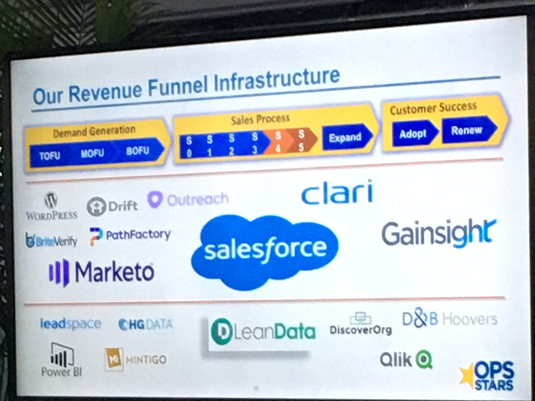If your business is going to switch to a RevOps model, you need a talented team, and preferably not a team of one.
TwentyPine is a boutique headhunting agency focused exclusively on recruiting ops talent within the Salesforce eco-system. At OpsStars this week, senior principle Jerry Bonura laid out the opportunities and pitfalls on the recruitment trail. One thing to know: serious RevOps talent (not just Salesforce admins) is at a premium. Businesses need to have a coherent strategy for attracting and retaining them.
What do candidates want?
The candidates you should be interested in want:
- To work for a business in a phase of rapid growth
- A seat at the table where business decisions are made
- A strategic role, not just an administrative one
- A sense that the business has a long-term vision
Those are not the candidates you should recruit if you do just want someone to set up, clean up, or run a Salesforce instance.
What should you do?
The business doing the hiring should have a plan.
- It’s crucial to involve all the stakeholders, especially as RevOps is cross-functional
- Profile four to six critical skills, four to six desired skills, and identify deal breakers
- Develop objective criteria, e.g. Q&A templates which can be scored objectively
Understand that candidates will fall on a range between sophisticated, high-level RevOps professionals who will take a high level view of the function, and again, Salesforce administrators. Most fall between those two extremes. Find your “sweet spot,” said Bonura.
What shouldn’t you do?
Here are some common hiring mistakes in this category:
- Waste time looking for a unicorn
- Deploy an inefficient process which turns off candidates (they are likely interviewing elsewhere, or at least looking)
- Cling to bias (not necessarily race- or gender-based, Bonura explained, but hiring on the basis of, say, likeability)
Why are they going to leave?
Hiring the right person is only step one. Retaining them is the next challenge. Here are reasons for them to walk out the door (because they are, of course, in high demand):
- They’re stuck in a tactical role (or worse, you made them a Salesforce admin)
- They can’t impact change
- The business isn’t growing
- There’s an unwelcome change in the reporting structure
- They’re underpaid
This may seem an elaborate set of do’s and don’ts, but Bonura said of the recruiting process: “Structured and sophisticated leads to better outcomes.”








